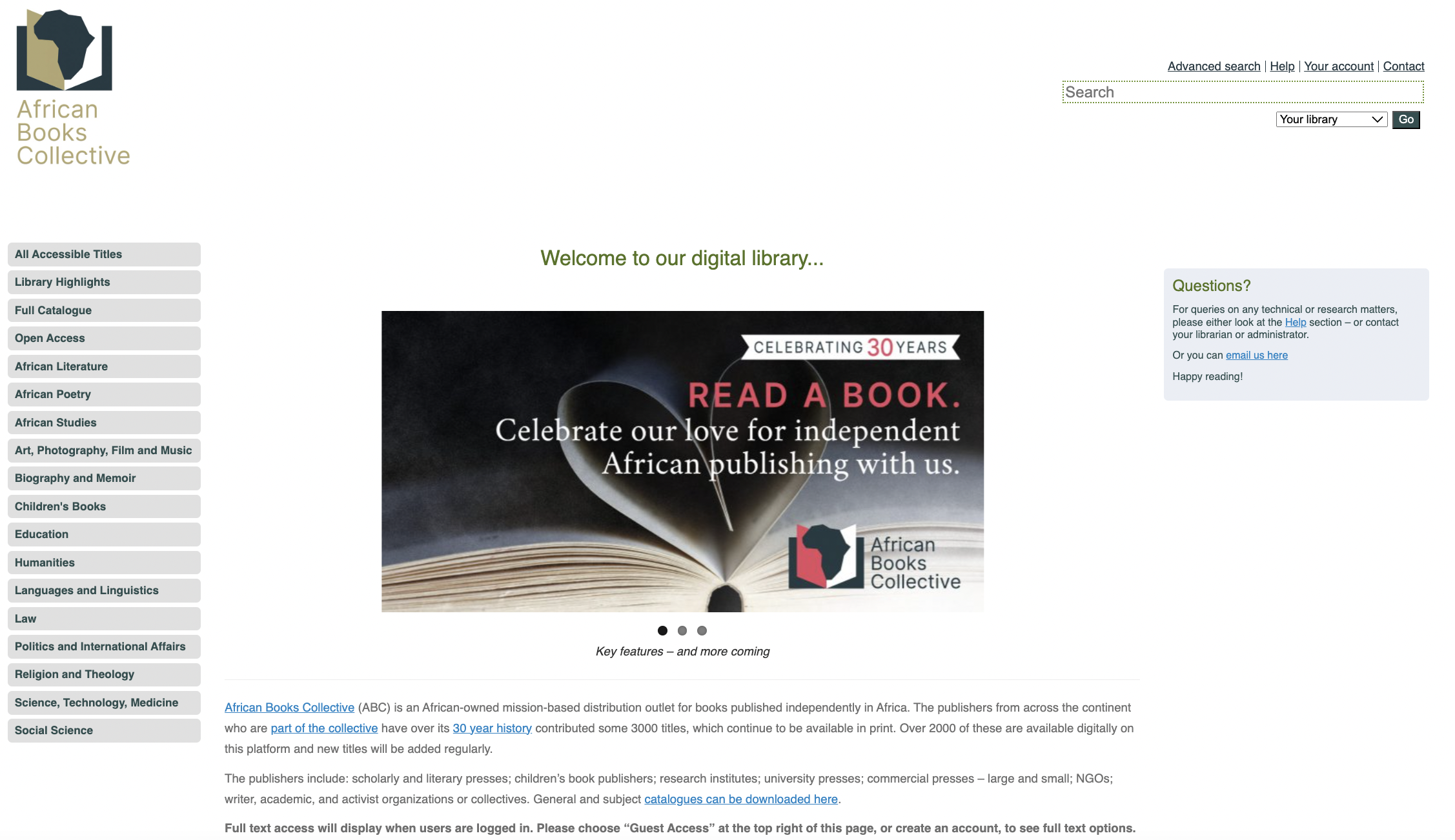The Transformative Potential of Ebooks in African Publishing

ABC launched its own ebook platform two years ago. Here, we discuss the progress and successes of distributing African published ebooks.
There are economic gains from enabling publishers to take direct control of their ebook distribution, both for African publishers and
libraries acquiring books from the continent. We suggest that digital libraries are the future of African publishing. They may eventually
help improve the dissemination of books within the continent itself.
African Book Collective (ABC) launched its own digital library of books published
in the African continent just two years ago. With over 2,300 titles, and approximately 300 titles being added annually, it is one of most
significant digital resources of African-published books. Titles are included from over 75 publishers. We are actively increasing the
number of titles published in African languages on the platform.
ABC is a small organisation that prioritises support for African publishers. Our motivation to establish an ebooks platform was to enable ABC’s publishers to take direct control of their ebook distribution, whilst improving their visibility and revenues.
ABC has been distributing ebooks over a period of 10 years. It continues to sustain positive relationships with aggregators, including Project Muse and JSTOR. But the ebooks programme had grown, and the moment seemed opportune to develop our own independent platform.
Some libraries prefer to work directly with smaller publishers. In 2022 we were approached by the Virginia Academic Library Consortium (VIVA) who wished to license ABC’s entire ebook collection. We worked closely with VIVA on developing the platform. Equally, other libraries prefer to work through suppliers such as Gobi Library Solutions with which we have recently set up an integration.
Since launching the platform, we have established relationships to directly supply ebooks to some of the key libraries in African studies, including the Nordic Africa Institute, the universities of Cambridge, Leeds, Florida and Toronto, and a consortium of academic libraries in Germany hosted at the Goethe University Library in Frankfurt.
We host a collection of open access ebooks (69 titles), at no cost to either libraries or publishers. Tiny proportions of open access books on Africa emanate from the continent itself. Those that do come almost exclusively from South Africa, notably from African Minds. (Open access books on Africa are overwhelming published in the USA, the UK and Germany.)
Most ABC ebooks are available DRM-free (without ‘digital rights management’). A small number of Literature titles still retain DRM at publishers’ request. But DRM is no longer a major issue for the publishers ABC represents, who trust us to manage protections and rights on their behalf.
The ABC ebook platform was launched within our ethos of enabling African publishers to control their own distribution: in areas such as pricing, business models, and direct relationships with libraries. Other benefits include technology support for readers, lower prices for libraries than through aggregators, higher returns to African publishers, and data accruing directly to ABC on sales and usage of collections.
ABC broke even on the considerable technology and marketing costs required for such an undertaking in 2022-23. In 2024, we are glad to be in surplus, which means higher returns to ABC’s participating publishers, given the Collective’s non-profit model to maximise returns to African publishers.
In future months, we plan to reach out to academic libraries in (South) Africa and Asia to expand the dissemination of our titles. There are two particular constituencies we are keen to engage with further.
African publishers themselves: to come forward with their ebook titles, to work with ABC on ensuring the best possible metadata, including supplying unique ISBNs for ebooks, that is essential for distribution and discoverability, and to consider making as much of their lists available as ebooks as possible. ABC provides production support to convert print books to ebook formats.
Second, university libraries with interests and programmes in the study of Africa in the arts, humanities, and social sciences. We know that many libraries prefer to work through third-party suppliers, and we are happy to cooperate with you on any basis. But by working with us directly, you are assisting our core mission of supporting a sustainable and independent publishing industry in the African continent.
Marc-André Ledoux of Nouvelles Editions Numériques Africaines (NENA), a Senegal based ebook platform, describes in a forthcoming article in the journal Logos how NENA has made over 4,000 ebooks available from Africa. Over 50 per cent of the publishers represented are francophone. Around 50 percent of the collection, that we are keen to help grow, emanates from ABC.
Commenting on the well known book distribution difficulties in the African continent, Ledoux writes that ‘to read in Togo a book published in Senegal involves an obstacle course, since there are no distribution logistics. And yet a majority of people have at least one digital book reader, which is also used to telephone and exchange messages with members of their social networks’. He asserts that ‘digital libraries are the future of African publishing’.
We tend to agree. Print publishing remains key for books and ABC’s print books programme continues to grow. But a carefully corroborated ebooks strategy has the potential to address some of the longstanding economic and distributional challenges in the African books and publishing sectors, whilst responding to the growing digitisation of academic library resources.
Stephanie Kitchen, co-director, African Books Collective
Julian Russ, ebooks platform manager, African Books Collective
For more information, please contact: ebooks@africanbookscollective.com